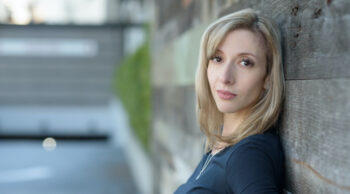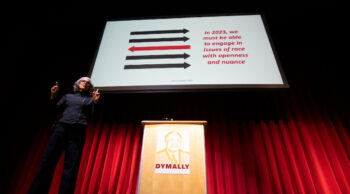In discussions of race, racism, and identity, Jewishness is a contested category. Particularly in the U.S., Jewish people are often considered white; they are framed as a religious group, rather than an ethnic one. However, this categorization can make antisemitism–and Jewish people themselves–invisible in both academic and popular discourses. Associate Professor of English Mara Lee Grayson's new book, Antisemitism and the White Supremacist Imaginary: Conflations and Contradictions in Composition and Rhetoric (Peter Lang, 2023), explores that erasure and its impact on Jewish scholars. As a Jewish woman, Grayson says the ideas within the book had been “percolating” within her for years, ... Read More
Whiteness
Robin DiAngelo Challenges White People To Be Anti-Racist
To help dismantle systemic racism, white people need to first acknowledge that it exists–and how they personally benefit from it. That was the central argument delivered by Robin DiAngelo to an audience of CSUDH students, faculty, staff, and community members at the University Theatre on February 1. DiAngelo, a bestselling author and academic specializing in whiteness and racism, was invited by the CSUDH Mervyn M. Dymally African American Political and Economic Institute for its Distinguished Speaker Series. Dymally Executive Director Anthony Asadullah Samad kicked off the event by acknowledging that having a white featured speaker on the first day of Black History Month might ... Read More

